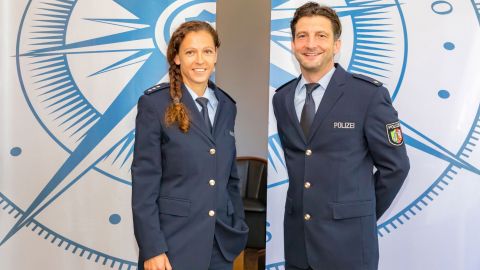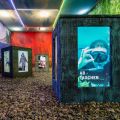Following the death of African-American George Floyd during a police operation in the US city of Minneapolis, the question of appropriate behavior by law enforcement officers has become even more explosive. The responsibility and limitation of state violence is being discussed around the world.
In NRW, the debate about police culture has a long tradition. The impetus for the "Grenzgang" exhibition came from the cooperation between the police and the church. This began back in the 1960s. This close cooperation gave rise to the desire to respond directly to existential needs and provide assistance. Police officers repeatedly experience things in their job that are almost unbearable. These are tightrope walks that put a strain on body and mind.
After a 13-month development phase, the didactic platform "Grenzgang" was launched in the fall of 2010. Since then, a team has been moderating the points addressed in the exhibition. Four main themes were selected for the presentation. The first is the question of social equality. This is followed by the complex issues of police and violence, extreme situations and danger, and dealing with death and dying. Every police trainee visits the exhibition at least once during their training, either directly in Selm or virtually at the training centers in Schloß Holte-Stukenbrock or Brühl. Since 2014, the Grenzgang has been part of the Center for Ethical Education and Pastoral Care in the NRW Police (ZeBus).
Police Chief Superintendent Lil Herholz has been a teacher in Selm since 2013. Initially, the former patrol officer taught young students. Now, the mother of an eight-year-old daughter also discusses the content of the tour with managers in a practical way, taking ethical aspects into account.
It is about the tension between human imperfection on the one hand and expected professionalism on the other, regardless of the respective background. Unclear, dangerous, but also emotional situations do not leave people in uniform cold. "Right from the start, we wanted to avoid talking about the basic attitudes and behaviors of police officers in a detached way," explains Herholz. Using pictures, photos, evidence, interviews, films and texts, an atmosphere has been created that stirs emotions and triggers processes of reflection, she emphasizes.
The exhibition has just been updated and modernized. The "Grenzgänger" have improved the scenographic design. They make greater use of digital media than before and pick up on recent developments and sensational incidents.
Social divide
In order to explore the social divide, room one shows various groups that the police often have to deal with - white-collar criminals, drug addicts, clan members, young offenders, homeless people and refugees. The aim is for viewers to empathize with different living environments at eye level. "Police officers are only human," comments Herholz. Nobody is perfect. Disgust, anger, fear and prejudice can prevent a police officer from behaving professionally. Your own blockades can be overcome once you are aware of them. "The Basic Law obliges us to respect and protect the human dignity of everyone," clarifies the police chief inspector. Remaining morally stable is a challenge. "It has to be overcome."
Violence
The second room deals with violence. The police become its victims, but also use it themselves, for example when someone resists arrest. "Of course, the means must remain proportionate," says Lil Herholz. She points out serious differences in the training and further training of the police in the USA and Germany. "If someone is lying on the ground, the person has to be lifted up quickly so that they can get enough air," she continues, alluding to the disturbing images from the USA.
The moderators of the "Grenzgang" repeatedly use case studies to provide discussion-worthy impulses. "Despite all the empathy, we must not put our own people at risk," says the committed pragmatist. "Appropriate safety measures must also be considered."
Terror and killing sprees
Room three is confronted with terrorists and killing sprees - a deadly threat. Those who encounter evil run the risk of losing sight of the good. Events from recent history, such as the Islamist attacks in Paris, Nice and Berlin, can be called up on a video wall at the touch of a button. The right-wing extremist attack on the synagogue in Halle is also dealt with in this context. Elsewhere, a timeline recalls terrorist phenomena from the past, including the acts of violence committed by the left-wing extremist "Red Army Faction", also known as the Baader-Meinhof gang.
"You have to keep a cool head and not let your emotions get the better of you," warns Lil Herholz. "You won't get my hatred," she quotes a victim who lost his wife in the attack on the Bataclan concert hall in Paris.
A police officer's own helplessness in the face of senseless brutality is often particularly devastating, says the ethics lecturer. However, they can always fall back on a variety of psychosocial support measures, such as the PSU team NRW or the Social Science Service (SwD) at LAFP NRW. However, it is just as important to be supported by your own colleagues in difficult moments.
Death and dying
The final room is about death and dying. There is an officer holding the hand of an accident victim in his last minutes. And a policewoman who has to tell parents that their child is no longer alive. Or a patrolman struggling with himself because he shot an attacker in self-defense. "These missions leave their mark on people. Sometimes it doesn't just hurt the body, but also the soul," emphasizes Herholz. Some become unfit for duty after such incidents. "We want to do our part to ensure that people are ethically and morally prepared for such situations. We hope that this can contribute to better coping with an extreme situation."
Some people have put on a thick skin as protection, the police chief inspector notes. Repression is one way for police officers to deal with stress. However, sharing experiences within their own department after serious events is also perceived as relieving. Finding and maintaining a mental balance is a very individual process. In the last room of the "Grenzgang", the scales symbolize the importance of inner balance: "Our job will certainly put a strain on each of us over the course of our careers. More for some, less for others. The balance, the relief, is the decisive factor so that the scales always remain in balance. In the best-case scenario, the balance of reliefs outweighs the burdens." Time with her own family and sport are the balance for Lil Herholz.
Resonance is increasing
By March 2020, 19,981 visitors had become acquainted with Selm's "Grenzgang", including 17,502 police officers and 2,479 interested citizens. Police councillor Stefan Heimbuch has been in charge of the office since October 2019. He is supported by Lil Herholz, two other police officers and three chaplains. There is also a scientific position. By 2019, 3,925 police officers had virtually taken up the offer. The whole thing is a success story. "The response is increasing," says Lil Herholz happily. The neighboring Netherlands was the first EU country to adopt key elements of the concept. Other federal states are also taking inspiration. Police trainees from Schleswig-Holstein have been going directly to Selm for many years. Lil Herholz believes that the subject area of ethics is an important part of basic and advanced training in the practically oriented police profession. Anyone's moral stability can be shaken when difficult operational situations become more frequent. And that's when ethics is needed: "We want to initiate the self-reflection process in 'Grenzgang' and thereby strengthen our colleagues for their tasks."

